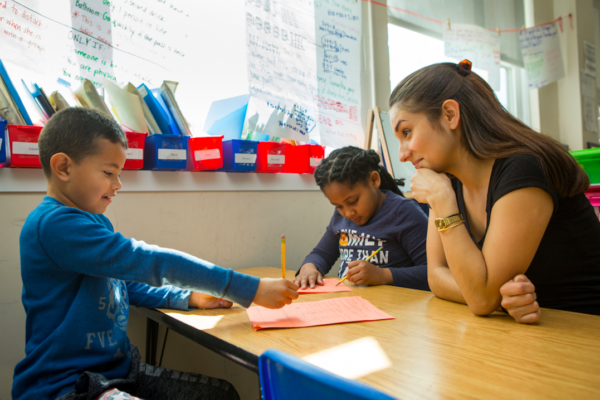Nick Woolf of InsideSEL spoke with the Craig Wacker and Lynn Olson, the two authors our Teacher Mindsets report, to unpack their findings and to discuss their thoughts on the roles of data, family-school partnerships, and “wise feedback” in social-emotional learning. Here’s his interview, originally published by InsideSEL.
In the field of SEL, it seems that a considerable amount of literature and content focuses on students’ social and emotional skills. What prompted the FutureEd team to explore how educators’ attitudes and beliefs impact student success?
We had seen a number of interesting studies on how teachers’ beliefs, behaviors, and attitudes impact student motivation and learning. We wanted to pull that research together in one place and look at how schools are beginning to translate those findings into practice.
When you two went into the field to see how schools at the forefront of this work, what were some of the most surprising and noteworthy practices that you observed?
We were struck by two things. First, a number of sites are developing walk-through rubrics, or using videos, to help teachers reflect on how their own behaviors and attitudes shape classroom environments and student learning. Second, these schools really worked to create a safe space for educators to have difficult conversations, in the same way that it’s important to create a physically and emotionally safe learning space for students.
It was fascinating to read about the role of feedback in student attitudes and outcomes. Can you explain what “wise feedback” means and its connection to racial equity in SEL?
“Wise feedback” is a term coined by psychologist David Yaeger. It’s essentially about providing feedback that motivate students and proactively counters racial stereotypes, rather than shutting students down. Students of color can construe critical feedback of their academic work as a teacher doubting their intelligence because of stereotypes in the larger society. In wise feedback, the teacher conveys the high standards he or she has for the student; assures the student that he or she can meet those standards, which lessens the possibility that the student will see the feedback as limiting; and provides resources, including concrete suggestions for how to improve, to help the student reach the standards.
Can you speak to the importance of family-school partnerships in this work and how impactful something such as a home visit can be in shifting an educators’ mindset?
Parents believe in the importance of joining forces with educators to promote their children’s success. But particularly when teachers and families come from different cultural and community backgrounds, they can have negative assumptions about each other, consciously or unconsciously. A study by RTI International of the Parent Teacher Home Visits Model, which trains educators to visit the homes of their students in teams of two, found that after completing a structured home visit, many teachers recognized their students’ families had high ambitions for their children and moved from thinking that students lacked motivation or interest in school to acknowledging their capabilities. As a result, educators reported greater efforts to communicate with families, a more empathetic approach to discipline, and an enriched understanding of students’ interests and cultures.
Some of the models and examples that are mentioned throughout the report recommend utilizing student surveys to strengthen teacher mindsets. How do you view the role of data in both assessing students’ social and emotional competencies as well as guiding educators and administrators to best serve their needs?
This type of data can be useful for formative feedback to help ground and deepen teachers’ discussions about the environments they’re creating in classrooms and the opportunities they’re providing to students. The schools we visited were using such data to continually improve their practice and not for high-stakes accountability, which is inappropriate.
What do you see as the biggest barriers for districts to start to add some of these recommendations — such as PD that specifically addresses these topics — to their SEL or Student Support strategies?
Some of these recommendations—such as learning to provide “wise” feedback—are easier to do than others. In many schools, creating structures and time to develop strong teacher-student relationships is difficult, particularly in large, comprehensive high schools. And we think there’s a level of trust between teachers and administrators that probably needs to proceed these efforts, so that teachers don’t feel they’re being blamed or shamed but rather are supported to try new practices and to have difficult conversations.
